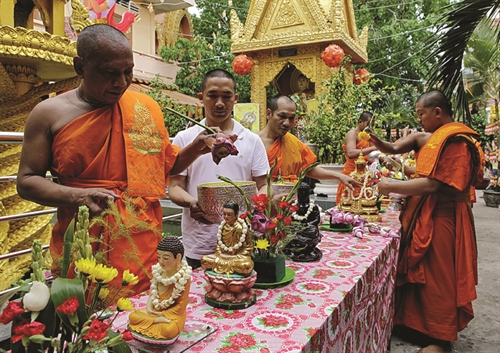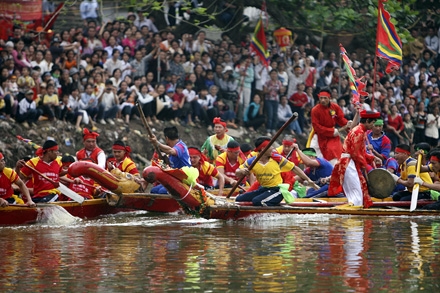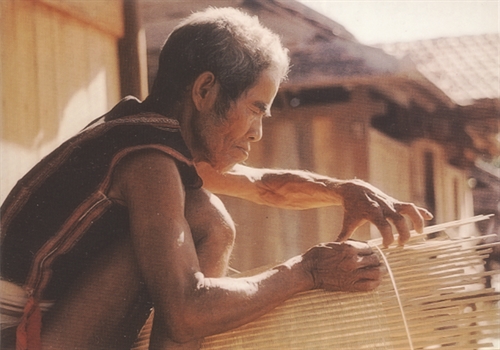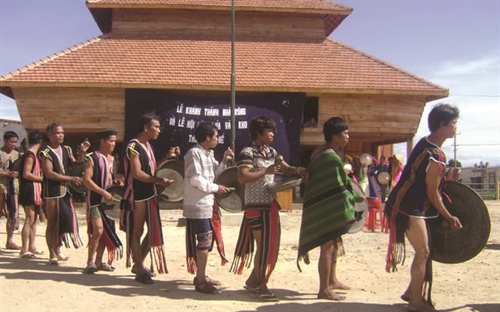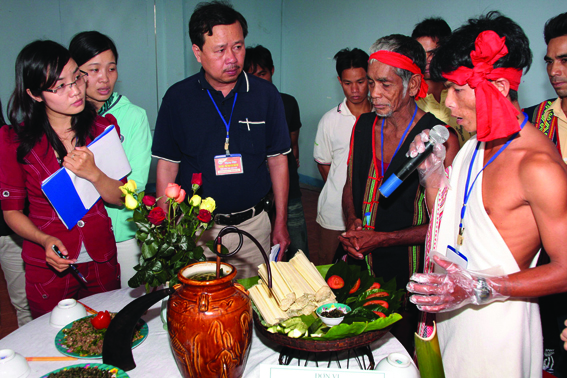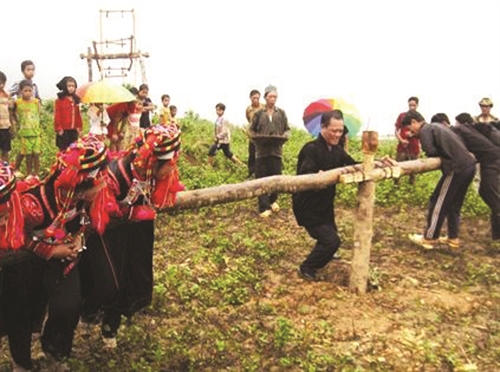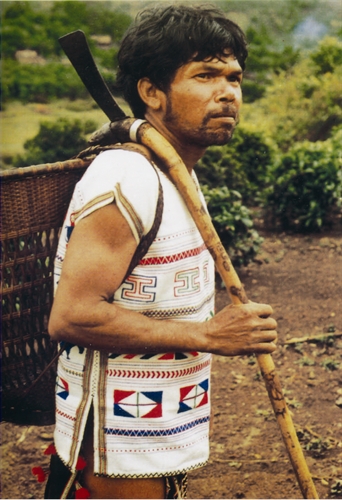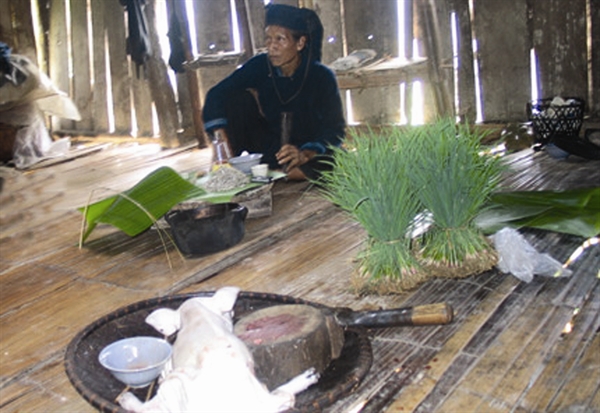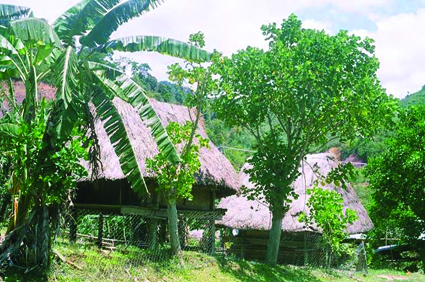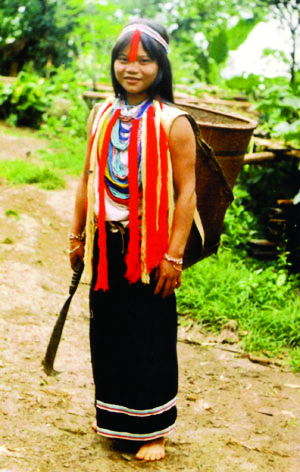>>The Bo Y customary practices
Ta Thi Tam
Ethnology Institute
The lunar new year festival is the biggest event in the year for the Bo Y, a small Tay-Thai language group living in the northern mountainous provinces of Ha Giang, Lao Cai, Yen Bai and Tuyen Quang.
The new year festival, which lasts three days from the last day of the old lunar year through the second day of the new year, is dedicated to Bo Y ancestors and gods to pray for their support for a new year of peace, health and prosperity.
In the middle of the 12th lunar month, the Bo Y start storing rice and food to make offerings for their most important festival. The offerings include sticky rice dyed in red, banh chung (square sticky rice cake filled with green bean paste and pork), banh day (round pure sticky rice cake) and banh chay (round sticky rice cake filled with green bean paste).
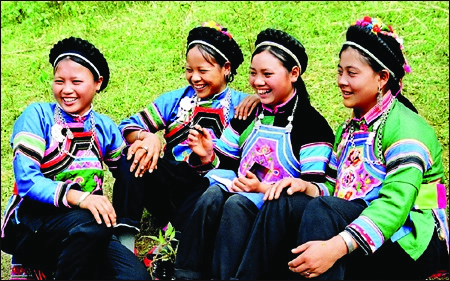 |
| The Bo Y girls in Ha Giang province__Photo: Internet |
An indispensable item every Bo Y family must buy before the lunar new year comes is garlic, which is believed to contain essence of earth and heaven and give luck to the family.
On the new year’s eve, every Bo Y family kills a chicken to make offerings to the ancestors. The offerings must be placed on the ancestor altar by the male owner of the family who represents the family to pray for the ancestors’ support for a new year of health, happiness and prosperity. Women are not supposed to arrange the tray of offerings on the new year’s eve as this is believed to bring misfortune to the family. At midnight on the new year’s eve, the Bo Y offer banh khoai (a cake made from sticky rice mixed with ginger and brown sugar) to the kitchen god, the holy mother and family ancestors who are worshiped on three separate altars.
Early morning of the next day, the Bo Y make vegetarian food, which include tofu and banh khoai, for offering to the ancestors. On the first day of the new year, the group has a taboo on killing animals and eating meat, which, in their belief, is not good to start a new year. Therefore, all bowls and dishes used to contain vegetarian offerings must be cleaned with boiling water to be fat-free. After the offering ritual dedicated to the ancestors, all family members have a meal together. They then wrap cakes in straw or grass to feed cattle which largely help farming work and thus should be taken good care of.
The Bo Y have a custom of visiting parents, siblings and relatives on the first day of the new year to wish them all the best. However, members of a family who had a sick or dead person in the old year are not supposed to visit others because they are believed to spread their misfortune to other families. A Bo Y family often invites a healthy and smart person to be its first guest in the new year in the belief that this person will bring along best luck. This first visitor will give best wishes to the family which will offer him some lucky money and a cup of wine to thank him and wish him best luck too.
On the first three days of the new year, a family is not supposed to clean the floor of its house because that will sweep away all riches throughout the year. Family members should not break anything either to avoid bad luck in the new year.
On the second day of the new year, the Bo Y kill a rooster to make offerings to the ancestors and use its legs to predict the family’s fortunes in the new year. The rooster, which must have a red crest and yellow feet, is sacrificed in front of the ancestor altar in the middle part of the house. The offerings for this ceremony include a bottle of wine, three small bowls, three pairs of chopsticks, a bowl of water, votive papers and incense, which are placed on a small table in front of the altar. The family owner as the ritual conductor burns three incense sticks, and with the rooster in his hands, kowtows three times to the altar. He then recites prayers, inviting ancestors to return home to have the offerings and asking for their support for the family. After that, he pours wine into three bowls and cuts the fowl’s throat to get its blood which is contained in the bowl of water. He then wipes the throat of the poultry with a votive paper and sticks it on the left of the altar. He also picks up and dips some feathers into the bowl of chicken blood and puts them on the votive papers. After this formality, the fowl is cleaned and boiled together with the viscera for offering to ancestors. After the offering ritual, the family has a meal during which family members drink wine and wish one another for a happy and prosperous new year.
In several following days, the Bo Y continue visiting relatives and villagers to exchange best wishes for the new year. They also play folk games such as chess, tug of war and top spinning. The new year festival is also an occasion for young people to make friends and find their lovers as they gather for responsive singing and folk game playing.
Other annual festivals of the Bo Y are sip ha (the 15th of the first lunar month), chenh dap (the 30th of the first lunar month), chenh xam (the 3rd of the third lunar month), toan vu (the 5th of the fifth lunar month), chenh xoc (the 6th of the sixth lunar month), chenh xip phay (the 15th of the seventh lunar month) and chenh o mua (new rice festival).-
